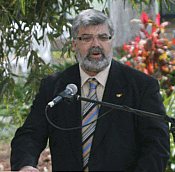|
|
|
|
|
|
|
News & Views item - July 2010 |
![]() Senator Carr Addresses the Innovate Research Universities Senior Staff Forum.
(July 7, 2010)
Senator Carr Addresses the Innovate Research Universities Senior Staff Forum.
(July 7, 2010)
Antonio Vivaldi is credited with composing something over 500 concerti, but one critic unkindly revised the estimate by stating it was the same piece written 500 times.
 The
Federal Minister for Innovation, Industry, Science and Research, Senator Kim
Carr, earlier today lectured the senior staff forum of the Innovate Research
Universities (IRU) which is comprised of Charles Darwin University, Flinders
University, Griffith University, James Cook University, La Trobe University,
Murdoch University and The University of Newcastle.
The
Federal Minister for Innovation, Industry, Science and Research, Senator Kim
Carr, earlier today lectured the senior staff forum of the Innovate Research
Universities (IRU) which is comprised of Charles Darwin University, Flinders
University, Griffith University, James Cook University, La Trobe University,
Murdoch University and The University of Newcastle.
Much of what he had to say he has said before in reiterating what the past 30 months under a Labor government has achieved in improving the lot of Australia's universities, and it would be churlish to deny that their milieu is significantly improved compared to the state in which they found themselves after 11¾ years of Coalition rule.
In my own portfolio, we have seen the biggest single increase in Commonwealth spending on research and innovation ever witnessed in this country – a 34 per cent boost since 2007.
On the teaching and learning side, we have introduced a funding model that will ensure every young Australian with the capacity to benefit from a university education can get one – regardless of their background.
On the research side, we have addressed the gap in funding for indirect research costs and introduced Excellence in Research for Australia to monitor and promote quality.
We have improved indexation across the board to put universities on a more sustainable footing.
But the minister also gave an update with regard to compacts, the ERA, and even made promises, if carefully couched, as well as a veiled threat or two.
How do we balance the expectations and incentives ERA will create against our wish to see universities forging closer relationships with industry and the community?
How do we promote engagement?
How do we measure it?
The Government doesn’t have all the answers to these questions, and it would be good to hear what you think.
That said, I do think we have part of the answer, and that is mission-based compacts.
[W]e have 40 interim agreements in place and we are working toward fully-fledged compacts that will go a long way toward defining the relationship between each institution and the Commonwealth.
Mission-based compacts will prompt each university to:
● think about its role
● define its mission
● describe how it will fulfil that mission
● and meet the government’s broader policy
goals.
They will increase transparency and accountability, while at the same time encouraging diversity and autonomy.
Mission-based compacts will help focus these efforts, so everyone has an interest in getting them bedded down. You will soon have the opportunity to comment on the draft template, and meetings to negotiate content are planned for later this year. The aim is to have compacts in place from 2011.
Once again emphasis was placed on funding for physical infrastructure and dealing with the dilapidated state of STEM teaching is still at best a vague promise with developing the programs to increase and improve Australia's research personnel now the focus of Meeting Australia’s Research Workforce Needs in order that "Australia develop the research firepower it needs to prosper in a rapidly changing world by developing a Research Workforce Strategy for the next decade and beyond".
Senator Carr told his audience:
Consultations will conclude in August, and work on the strategy should be completed later this year. It will build on the steps we have already taken to increase supply – most notably by doubling the number of Australian Postgraduate Awards and increasing the stipend by 10 per cent and by overhauling and expanding the Australian Research Council’s fellowship offerings to create viable career paths for researchers in Australia.
And he added:
Sustainable Research Excellence in Universities will eventually more than double the funding available to meet indirect research costs. It will be worth not millions, but billions to the sector long term, [and] the improved indexation formula for Higher Education Support Act research programs will be worth hundreds of millions of dollars over the next decade.
Nevertheless, he warned: There is no such thing as a free lunch, however, and the community is entitled to expect rigour and accountability from universities in return for its largesse. That’s what Transparent Costing is about. That’s what Excellence in Research for Australia is about. That’s what the Tertiary Education Quality and Standards Agency is about. Each of these measures has attracted its share of controversy, but each is essential to the reform agenda.
It's as though he cannot overcome his background as a high school history teacher dealing with obstreperous pupils.
Unfortunately he and the government appear to be incapable of seizing the main
chance to derive the formulae to attract the world's best and brightest while
severe austerity grips Australia's cohort nations.